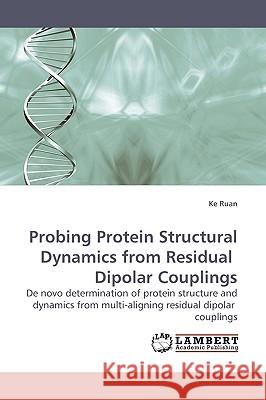Probing Protein Structural Dynamics from Residual Dipolar Couplings » książka
Probing Protein Structural Dynamics from Residual Dipolar Couplings
ISBN-13: 9783838303895 / Angielski / Miękka / 2010 / 156 str.
Residual dipolar couplings (RDCs) provide explicit information of the molecular structure and dynamics in solution at atomic level. Full utilization of RDC datasets requires the acquisition under multiple aligning conditions, which remains experimentally challenging. We have illustrated in an application to ubiquitin that molecular alignment can be modified by varying the morphological characteristics of a composite medium, composed of ordered bacteriophage Pf1 particles embedded within stretched polyacrylamide gel matrix. The molecular alignment in this composite media could be adjusted by varying the angles between the directors of ordering for the Pf1 and strained gel, or by varying the concentrations of the components or magnesium. Since the acquisition of five independent RDC datasets still remains a difficulty, we develop a protocol that allows for the de novo determination of bond vector orientations from RDC measured in three independent alignment media assuming rigidity. The method proceeds by least squares optimization of both bond orientations and alignment tensors starting from an appropriately chosen initial guess.











